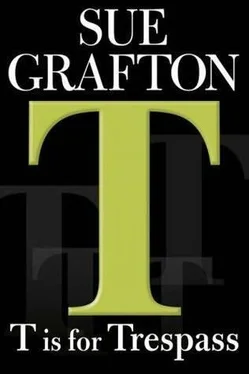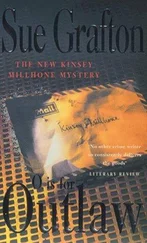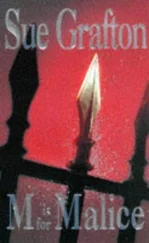I studied her job history, noting a number of private-duty assignments. Her most recent employment was a ten-month stint at a convalescent home, where her duties had included the application and changing of bandages, catheterizations, irrigations, enemas, collecting specimens for lab analysis, and the administering of medications. The salary she listed was $8.50 an hour. Now she was asking $9.00. Under the heading “Background,” she indicated she’d never been convicted of a felony, that she wasn’t currently awaiting trial for any criminal offense, and that she’d never initiated an act of violence in the workplace. Good news, indeed.
The list of her employers, starting with the present and working backward, included addresses, telephone numbers, and the names of supervisors, where appropriate. I could see that the dates of employment formed a seamless progression that covered the years since she’d been licensed. Of the elderly private-duty patients she’d cared for, four had been moved into nursing homes on a permanent basis, three had died, and two had recovered sufficiently to live on their own again. She’d attached photocopies of two letters of recommendation that said just about what you’d expect. Blah, blah, blah responsible. Blah, blah, blah competent.
I looked up the number of Santa Teresa City College and asked the operator to connect me with Admissions and Records. The woman who took the call was in the throes of a head cold and the act of answering the phone had triggered a coughing fit. I waited while she struggled to get the hacking under control. People shouldn’t go to work with head colds. She probably prided herself on never missing a day while everyone around her came down with the same upper-respiratory distress and used up their annual sick leave.
“Excuse me. Whew! I’m sorry about that. This is Mrs. Henderson.”
I gave her my name and told her I was doing a preemployment background check on a Solana Rojas. I spelled the name and gave her the date she’d graduated from the STCC nursing program. “All I need is a quick confirmation that the information’s accurate.”
“Can you hold?”
I said, “Sure.”
While I was listening to Christmas carols, she must have popped a cough drop in her mouth because when she came back on the line, I could hear a clicking sound as the lozenge was shifted across her teeth.
“We’re not allowed to divulge information on the telephone. You’ll have to make your request in person.”
“You can’t even give me a simple yes or no?”
She paused to blow her nose, a sloppy transaction with a honking sound attached. “That’s correct. We have a policy about student privacy.”
“What’s private about it? The woman’s looking for a job.”
“So you claim.”
“Why would I lie about something like that?”
“I don’t know, dear. You’ll have to tell me.”
“What if I have her signature on a job application, authorizing verification of her educational background and employment history?”
“One moment,” she said, aggrieved. She put a palm across the telephone mouthpiece and murmured to someone nearby. “In that case, fine. Bring the application with you. I’ll make a copy and submit it with the form.”
“Can you go ahead and pull her file so the information’s waiting when I get there?”
“I’m not allowed to do that.”
“Fine. Once I get up there, how long will it take?”
“Five business days.”
I was annoyed, but I knew better than to argue with her. She was probably hyped up on over-the-counter cold medications and eager to shut me down. I thanked her for the information and then I rang off.
I made a long-distance call to the Board of Vocational Nursing and Psychiatric Technicians in Sacramento. The clerk who took my call was cooperative-my tax dollars at work. Solana Rojas’s license was active and she’d never been the subject of sanctions or complaints. The fact that she was licensed meant she’d successfully completed a nursing program somewhere, but I’d still need to make a trip to City College to confirm. I couldn’t think why she’d falsify the details of her certification, but Melanie had paid for my time and I didn’t want to shortchange her.
I went over to the courthouse and made a run through public records. A check of the criminal index, the civil index, the minor offenses index, and the public index (which included general civil, family, probate, and criminal felony cases) showed no criminal convictions and no lawsuits filed by or against her. The records of the bankruptcy court came up blank as well. By the time I drove up to City College, I was reasonably certain the woman was just as she represented herself.
I slowed to a stop at the information kiosk on campus. “Can you tell me where I can find Admissions and Records?”
“Admissions and Records is in the Administration Building, which is right there,” she said, pointing at the structure dead ahead.
“What about parking?”
“It’s open in the afternoons. Park anyplace you like.”
“Thanks.”
I pulled into the first open slot I came to and got out, locking my car behind me. From my vantage point, there was a view of the Pacific through the trees, but the water was gray and the horizon was obscured by mist. The continued overcast made the day feel colder than it was. I slung my bag across one shoulder and crossed my arms for warmth.
The architectural style of most campus buildings was plain, a serviceable mix of cream-colored stucco, wrought iron railings, and red-tile roofs. Eucalyptus trees cast mottled shadows across the grass, and a light breeze ruffled the fronds of the queen palms that towered above the road. There were six or eight temporary classrooms in use while additional facilities were being built.
It was odd to remember that I was enrolled here once upon a time. After three semesters, I realized I wasn’t cut out for academic studies even at the modest level of Everything 101. I should have known myself better. High school had been a torment. I was restless, easily distracted, more interested in smoking dope than learning. I don’t know what I thought I was going to do with my life, but I sincerely hoped I wouldn’t have to go to school to do it. That ruled out medicine, dentistry, and the law, along with countless other professions that I didn’t find appealing in the least. I realized that without a college degree, most corporations wouldn’t have me as a president. Oh dang. However, if I read the Constitution correctly, my lack of education didn’t preclude me from becoming the President of the United States, which only required me to be a natural-born citizen and at least thirty-five years of age. Was that exciting or was it not?
At eighteen and nineteen, I’d drifted through an assortment of entry-level jobs, though with most the “entry” part was about as far as I could get. Shortly after I turned twenty, for reasons I don’t remember now, I applied to the Santa Teresa Police Department. By that time, I’d cleaned up my act, as bored with dope as I was with menial work. I mean, how many times can you refold the same stack of sweaters in the sportswear department at Robinson’s? The pay scale was pathetic, even for someone like me. I did discover that if you’re interested in low wages, a bookstore ranks below retail clothing sales, except the hours are worse. The same holds for waiting tables, which (as it turned out) required more skill and finesse than I had at my disposal. I needed a challenge and I wanted to see just how far my street smarts might take me.
By some miracle, I survived the department’s selection process, passing the written exam, the physical-agility exam, the medical and controlled-substance screening, and various other interviews and evaluations. Somebody must have been asleep at the wheel. I spent twenty-six weeks in the Police Officer Standards and Training Academy, which was tougher than anything I’d ever done. After graduation I served as a sworn officer for two years and found, in the end, that I was not that well suited for work in a bureaucracy. My subsequent shift into an apprenticeship with a firm of private investigators proved to be the right combination of freedom, flexibility, and daring.
Читать дальше












